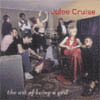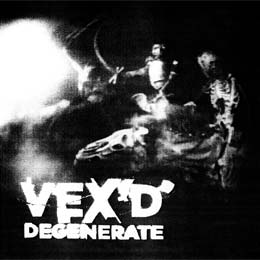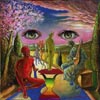Water Music 
The story goes like this: David Lynch wanted to use This Mortal Coil's haunting version of Tim Buckley's "Song to a Siren" for a pivotal scene in his classic film "Blue Velvet." Something about Elizabeth Frasier's ethereal, wavering voice and the echoing acoustic guitar was perfect for a particular scene in the film. For the rights to use the song, 4AD wanted a figure that was half the budget of the film he was making. Deeply disappointed that he could not afford the song, he asked the film's composer, Angelo Badalamenti, to write and produce a track that had a similar "feel". Badalamenti found a singer with the voice of an angel, Julee Cruise, an unknown who had been working off-off-Broadway, and with lyrics penned by Lynch, they composed the song "Mysteries of Love".
Although not quite the equal of "Song to a Siren", they saw a lot of potential, and eventually Lynch and Badalamenti teamed up to write and produce an album for Julee Cruise. Lynch wrote the lyrics and guided the sound, and Badalamenti filled out the sound with his excellent ear for composition. The classic album "Falling Into the Night" is a pop treasure, combining 1950s rockabilly guitar with darkly atmospheric synthesized strings and Cruise's angelic, overdubbed vocals. The Lynch/Balamenti/Cruise collaboration went on for several years, and the songs ended up in Lynch's "Twin Peaks" and Wim Wenders "Until the End of the World". There was a follow up album a couple of years later, 'Voice of Love'. It wasn't nearly as good, but it still captured the sound that had originally inspired Lynch/Badalementi. They even built a huge rock-opera spectacle around Julee Cruise, 1989's "Industrial Symphony No. 1".
Not satisfied to wait for Lynch and Badalamenti to write her another album, Julee has chosen a different group of collaborators to work with for her new album 'The Art of Being a Girl.' If anyone had any questions about how much input Julee had into her music all these years, this album should clear everything up. She had no input at all. Lynch/Badalamenti were using Julee as an instrument, a breathy "little-girl-lost" voice to accompany their atmospheric tracks. This is the first album where Julee has co-written songs, and it is an incredibly average affair. Her collaborators (Mocean Worker, Khan and some guy named J.J. McGeehan), have used a lot of trite studio tricks in an attempt to distract the listener from the fact that the songs are boring. Julee makes the error of trying to recreate herself as some kind of world-wise feminist diva. It feels really forced, and the album sounds like every other downtempo "sexy" electronic pop album with faceless female vocals.
Several of the tracks attempt to mimic Julee's guest star turn on Khan's awesome track "Say Goodbye" from last year's 'No Comprendo'; none of them live up to these aspirations. The compositions are tired and riddled with cliché. The laughable, non-sexy spoken word segments in many of the songs don't help at all. As a final insult, there is a hidden track, a new version of one of Julee's best songs from the Lynch/Badalamenti years, "Falling" (recognizable to many as the opening theme of Twin Peaks). This tepid version adds nothing to the original song, and it just serves as a reminder of how great the song sounded when it was in the hands of more talented collaborators. Julee Cruise's talent is serviceable in the proper context, when the songwriting and production is top-notch. However, this underachieving album pales in comparison to her previous work as a bit player in the grand Lynchian musical drama.
samples:
 Painting a picturesque landscape using nothing but melody and ingenuity has long been at the epicenter of avant pursuits. Lustrous locks of tonal notes floating in the breeze as each counterpart unfurls, becoming sinewy strings of texture set against a golden background. It is among such a romantic setting that the works of Fabio Orsi glimmer, catching the sun’s rays and beaming it back to the world as beautifully constructed song paintings. On his latest, Random Shades of Day, Orsi continues to emerge as a master of transforming music into mood through four pieces of richly layered drone set against a dreamy landscape.
Painting a picturesque landscape using nothing but melody and ingenuity has long been at the epicenter of avant pursuits. Lustrous locks of tonal notes floating in the breeze as each counterpart unfurls, becoming sinewy strings of texture set against a golden background. It is among such a romantic setting that the works of Fabio Orsi glimmer, catching the sun’s rays and beaming it back to the world as beautifully constructed song paintings. On his latest, Random Shades of Day, Orsi continues to emerge as a master of transforming music into mood through four pieces of richly layered drone set against a dreamy landscape.


 An entire summer passed without me publishing a single album review forBrainwashed, or any other site for that matter. Compact discs andpress releases arrived via post regularly, typically finding a home inpiles at the far end of my desk, next to a dust-collecting drummachine. Call it a lack of motivation, call it laziness, yet, on this unseasonably warm autumnnight, I have returned. It took thebest album of 2005 to accomplish that.
An entire summer passed without me publishing a single album review forBrainwashed, or any other site for that matter. Compact discs andpress releases arrived via post regularly, typically finding a home inpiles at the far end of my desk, next to a dust-collecting drummachine. Call it a lack of motivation, call it laziness, yet, on this unseasonably warm autumnnight, I have returned. It took thebest album of 2005 to accomplish that. Albums built around a concept of exploring an imaginary land don’t comealong too often and it’s an even rarer occasion when it looks likethey’re worthy of more than a cursory holiday.Black Sun Productions member Drazen brings to life an audio journeythat defies the awkwardness of the concept and demands repeat visits onthis his debut solo album.
Albums built around a concept of exploring an imaginary land don’t comealong too often and it’s an even rarer occasion when it looks likethey’re worthy of more than a cursory holiday.Black Sun Productions member Drazen brings to life an audio journeythat defies the awkwardness of the concept and demands repeat visits onthis his debut solo album. Some bands like a little variety on their releases. They don't mind if one song on the album sounds like a different band than the one before or after it. They don't even mind if every song sounds like a different band. Other bands use different albums or EPs to try out different concepts. In the case of Arco Flute Foundation, the members started another band entirely to put out this music. Arco Flute Foundation is the same principals who are in Meisha, but recording as such because the music is that much removed from their former selves. Meisha are languid, slight, and melodic with a subdued energy, recording instrumentals that are lush and captivating. Arco Flute Foundation, on the other hand, is more interested in loud, boisterous, loose instrumental rock. 'Everything After' is their third release on Cenotaph, and it is their most adventurous yet. More electronics, more Slint-like guitar antics, more distortion, and more ambient noise appear on these songs than have in the past. These passages are still unfocused and raw, however, with the band members seemingly exploring the space around them with these compositions. There are two tracks under the four-minute mark that seem to be the more structured songs (more accessible?), but beyond that the Foundation just let it bleed, adding and subtracting elements as the song progresses, trying to find their happy hunting ground. Honestly, it has some very interesting elements, but the two shorter songs are the best tracks solely because of their structure. The album's closer, "Seymour Uncle Billy," approaches what seems like the true sound of the band, a balance between the structure and improvisation, between the noise and the music. Now that they seem to have all of the instruments and sounds they want to explore, that should be the next area to perfect. Which means the next Arco Flute Foundation release could be a fine one, indeed.
Some bands like a little variety on their releases. They don't mind if one song on the album sounds like a different band than the one before or after it. They don't even mind if every song sounds like a different band. Other bands use different albums or EPs to try out different concepts. In the case of Arco Flute Foundation, the members started another band entirely to put out this music. Arco Flute Foundation is the same principals who are in Meisha, but recording as such because the music is that much removed from their former selves. Meisha are languid, slight, and melodic with a subdued energy, recording instrumentals that are lush and captivating. Arco Flute Foundation, on the other hand, is more interested in loud, boisterous, loose instrumental rock. 'Everything After' is their third release on Cenotaph, and it is their most adventurous yet. More electronics, more Slint-like guitar antics, more distortion, and more ambient noise appear on these songs than have in the past. These passages are still unfocused and raw, however, with the band members seemingly exploring the space around them with these compositions. There are two tracks under the four-minute mark that seem to be the more structured songs (more accessible?), but beyond that the Foundation just let it bleed, adding and subtracting elements as the song progresses, trying to find their happy hunting ground. Honestly, it has some very interesting elements, but the two shorter songs are the best tracks solely because of their structure. The album's closer, "Seymour Uncle Billy," approaches what seems like the true sound of the band, a balance between the structure and improvisation, between the noise and the music. Now that they seem to have all of the instruments and sounds they want to explore, that should be the next area to perfect. Which means the next Arco Flute Foundation release could be a fine one, indeed. I love the way CDs are programmable. For instance, I can take a disc like this one, with a strong opening, "Clear a Space for the King," which conjurs up space aliens grooving on a flashy dancefloor and listen along with the calm and pretty "Sprinkling Time," completely avoiding songs like "Transylvanian Spy" with its irritating, tinny two-bar melodies and "Lonely Stars" with its obnoxious fake piano riff that makes me want to throw things across the room. Reading the song titles, the record label's web site, and the distributor's release notes, each account for this album almost completely contradicts the others: ranging from a fascination with science fiction to the imitation of stomach and digestive sounds to references of musique concrête. While most of the music here is decent, I can't justify it receiving as much over-evaluation. Clearly, the one-man person behind Wang Inc., Italian Bartolomeo Sailer, is a talented individual, with a meticulous amount of attention paid to every instrument sound in each of the fifteen tracks. Rarely are sounds recycled from track to track. Comical punchiness on tracks like "Sonic Killer" would appease many Sonig fans while "Forgotten Kurdish Workers" can easily appeal to any lover of the spaceship hum from a black and white film. A little more patience with the melodies and a lot more discretion when deciding what to omit might be nicer, however.
I love the way CDs are programmable. For instance, I can take a disc like this one, with a strong opening, "Clear a Space for the King," which conjurs up space aliens grooving on a flashy dancefloor and listen along with the calm and pretty "Sprinkling Time," completely avoiding songs like "Transylvanian Spy" with its irritating, tinny two-bar melodies and "Lonely Stars" with its obnoxious fake piano riff that makes me want to throw things across the room. Reading the song titles, the record label's web site, and the distributor's release notes, each account for this album almost completely contradicts the others: ranging from a fascination with science fiction to the imitation of stomach and digestive sounds to references of musique concrête. While most of the music here is decent, I can't justify it receiving as much over-evaluation. Clearly, the one-man person behind Wang Inc., Italian Bartolomeo Sailer, is a talented individual, with a meticulous amount of attention paid to every instrument sound in each of the fifteen tracks. Rarely are sounds recycled from track to track. Comical punchiness on tracks like "Sonic Killer" would appease many Sonig fans while "Forgotten Kurdish Workers" can easily appeal to any lover of the spaceship hum from a black and white film. A little more patience with the melodies and a lot more discretion when deciding what to omit might be nicer, however. The story goes like this: David Lynch wanted to use This Mortal Coil's haunting version of Tim Buckley's "Song to a Siren" for a pivotal scene in his classic film "Blue Velvet." Something about Elizabeth Frasier's ethereal, wavering voice and the echoing acoustic guitar was perfect for a particular scene in the film. For the rights to use the song, 4AD wanted a figure that was half the budget of the film he was making. Deeply disappointed that he could not afford the song, he asked the film's composer, Angelo Badalamenti, to write and produce a track that had a similar "feel". Badalamenti found a singer with the voice of an angel, Julee Cruise, an unknown who had been working off-off-Broadway, and with lyrics penned by Lynch, they composed the song "Mysteries of Love".
The story goes like this: David Lynch wanted to use This Mortal Coil's haunting version of Tim Buckley's "Song to a Siren" for a pivotal scene in his classic film "Blue Velvet." Something about Elizabeth Frasier's ethereal, wavering voice and the echoing acoustic guitar was perfect for a particular scene in the film. For the rights to use the song, 4AD wanted a figure that was half the budget of the film he was making. Deeply disappointed that he could not afford the song, he asked the film's composer, Angelo Badalamenti, to write and produce a track that had a similar "feel". Badalamenti found a singer with the voice of an angel, Julee Cruise, an unknown who had been working off-off-Broadway, and with lyrics penned by Lynch, they composed the song "Mysteries of Love". As a listener, one of the more celebrated things about some prolific independent artists gaining more deserved recognition would be the availability of previous material that may have originally been issued in limited quantities, or else did not have as wide a distribution as present. Formerly released as a three-track twelve inch EP limited to 1,000 copies, the Scott Herren project of Delarosa + Asora's 'Crush the Sight-Seers' has recently materialized on CD through Chicago's Hefty Records, home to Herren's Savath + Savalas. In keeping with the added value of some reissues, a bonus track has been included. The recurring distorted keyboard chatters and metallic percussion sample of the opening track "OSSABAW" blends into a sub-bass progression and laid-back, half-time groove with the odd break to mark off sections of the tune. The two-and-a-half minute "OSS.BW" is a multi-layered piece of eerie drones, synth squelches and chimes that could be the equivalent of sound painting through channel surfing at a mixing console. "Airbrush (clogged)" builds from distorted vocal snippets and reverbed static to a cordial bass line and mid-tempo electro-percussion groove with a gradually building back beat. Eventually it all falls away leaving the distant sounds of distorted keyboards and squelchy tape shuttling. "Vs. Boah" skitters from static pops, sound layers and vocal samples to a dark sounding danceable groove which builds in intensity after each lengthy break. A shift in the key signature makes from a great release from all the tension the track builds. Dropping out just shy of the five minute mark for two-and-a-half minutes of silence, the music returns with an echo to the drones and hisses of "OSS.BW" to close off. While this disc may be an acquired taste as it's not as groove-oriented or melodically friendly as other Scott Herren projects, I'd have to say that it still makes for a great listen for just those reasons too. As mentioned in the liner notes, another good thing about CD reissues of unmarked RPM vinyl is hearing the tunes at the speed they were intended to be played at without any doubt.
As a listener, one of the more celebrated things about some prolific independent artists gaining more deserved recognition would be the availability of previous material that may have originally been issued in limited quantities, or else did not have as wide a distribution as present. Formerly released as a three-track twelve inch EP limited to 1,000 copies, the Scott Herren project of Delarosa + Asora's 'Crush the Sight-Seers' has recently materialized on CD through Chicago's Hefty Records, home to Herren's Savath + Savalas. In keeping with the added value of some reissues, a bonus track has been included. The recurring distorted keyboard chatters and metallic percussion sample of the opening track "OSSABAW" blends into a sub-bass progression and laid-back, half-time groove with the odd break to mark off sections of the tune. The two-and-a-half minute "OSS.BW" is a multi-layered piece of eerie drones, synth squelches and chimes that could be the equivalent of sound painting through channel surfing at a mixing console. "Airbrush (clogged)" builds from distorted vocal snippets and reverbed static to a cordial bass line and mid-tempo electro-percussion groove with a gradually building back beat. Eventually it all falls away leaving the distant sounds of distorted keyboards and squelchy tape shuttling. "Vs. Boah" skitters from static pops, sound layers and vocal samples to a dark sounding danceable groove which builds in intensity after each lengthy break. A shift in the key signature makes from a great release from all the tension the track builds. Dropping out just shy of the five minute mark for two-and-a-half minutes of silence, the music returns with an echo to the drones and hisses of "OSS.BW" to close off. While this disc may be an acquired taste as it's not as groove-oriented or melodically friendly as other Scott Herren projects, I'd have to say that it still makes for a great listen for just those reasons too. As mentioned in the liner notes, another good thing about CD reissues of unmarked RPM vinyl is hearing the tunes at the speed they were intended to be played at without any doubt. Using vinyl as an anachronistic commentary on technology and culture is all too common these days, but on this release, Loren Chasse takes a far more low-level view of the medium. He explores the detail inherent in the surface noise of records—kind of an analog representation of the digital "glitch"—and also juxtaposes it with similar sounds found in nature, such as wind, leaves, fire, and surf. The first of four untitled tracks combines layers of quiet cracking and popping with some distant-sounding music that's probably also coming from the record. The vinyl noises, spread throughout the stereo field, are continuously changing, and though they're simple and commonplace sounds, their combination with the soothingly indistinct music is warm and hypnotizing. The second track is significantly more aggressive, with louder, more distorted surface noises mixed with the sounds of wind and the ocean. There's considerable detail throughout the piece, but at times it's covered by such a thick wall of noise that close attention becomes necessary. What's fascinating is that this storm of sound, that at first seemed to overwhelm and mask the piece, holds in itself a deep level of richness and complexity. The third track is more dynamic, starting with some electronic hissing and buzzing and a little bit of crackle fading in and out, along with more barely perceptible music. It ebbs and flows while building up, like the tide that it samples, until it finally grows into a tumultuous roar. The final track is my favorite, as it features the best arrangement of the quietly melodic music submerged under what sounds like sand falling and the buzzing of a few really scratched up records. In all, 'Hedge of Nerves' is an interesting album with some moments of great subtle beauty. Though it may not be the best record for casual listening, it isn't too "conceptual" to be entertaining. According to Anomalous, it was designed in part to be used to make "virtual scratchy records" by mixing it with other sources, and it definitely succeeds in that and more.
Using vinyl as an anachronistic commentary on technology and culture is all too common these days, but on this release, Loren Chasse takes a far more low-level view of the medium. He explores the detail inherent in the surface noise of records—kind of an analog representation of the digital "glitch"—and also juxtaposes it with similar sounds found in nature, such as wind, leaves, fire, and surf. The first of four untitled tracks combines layers of quiet cracking and popping with some distant-sounding music that's probably also coming from the record. The vinyl noises, spread throughout the stereo field, are continuously changing, and though they're simple and commonplace sounds, their combination with the soothingly indistinct music is warm and hypnotizing. The second track is significantly more aggressive, with louder, more distorted surface noises mixed with the sounds of wind and the ocean. There's considerable detail throughout the piece, but at times it's covered by such a thick wall of noise that close attention becomes necessary. What's fascinating is that this storm of sound, that at first seemed to overwhelm and mask the piece, holds in itself a deep level of richness and complexity. The third track is more dynamic, starting with some electronic hissing and buzzing and a little bit of crackle fading in and out, along with more barely perceptible music. It ebbs and flows while building up, like the tide that it samples, until it finally grows into a tumultuous roar. The final track is my favorite, as it features the best arrangement of the quietly melodic music submerged under what sounds like sand falling and the buzzing of a few really scratched up records. In all, 'Hedge of Nerves' is an interesting album with some moments of great subtle beauty. Though it may not be the best record for casual listening, it isn't too "conceptual" to be entertaining. According to Anomalous, it was designed in part to be used to make "virtual scratchy records" by mixing it with other sources, and it definitely succeeds in that and more. A perfect assemblage of absurd clich√©s has been collected here by Organum's David Jackman. The cover and title both suggest something of both the dark and sinister mindsets: 'Verhalte Dich Ruhig' translates to English literally as 'Keep yourself calm,' but more aggressively could be referred to as 'Duck and cover'. The picture, on the other hand, may have been taken in an abandoned concentration camp or some completely harmless old house in Germany, but you'll never know for sure.
A perfect assemblage of absurd clichés has been collected here by Organum's David Jackman. The cover and title both suggest something of both the dark and sinister mindsets: 'Verhalte Dich Ruhig' translates to English literally as 'Keep yourself calm,' but more aggressively could be referred to as 'Duck and cover'. The picture, on the other hand, may have been taken in an abandoned concentration camp or some completely harmless old house in Germany, but you'll never know for sure. With his well-received debut album "Approximate Love Boat", Danny Zelonky emerged as Low Res with experimental electronic music in a style all his own. Low Res takes samples of a broad range of instruments and creates engrossing yet completely disparate music with them. It's clear that Zelonky, like a recent wave of electronic artists, believes that the best music is created through this approach, not through cheaply synthesized recreations that never sound genuine. But it's the way he accomplishes this goal on his second LP "Blue Ramen" that is truly ingenious. Even with real instruments at his disposal - including real drums and percussion - nearly every beat and sound is programmed on these songs. The instruments were not recorded the way they are played and then assembled in a collage with beats. Every note is placed there in a systematic piece-by-piece approach. So what escapes from the speakers sounds at once improvised and freeform, like a group of musicians playing together, when in fact every part of it is structured meticulously by Low Res to help end the "cheap karaoke" sound of synths and samplers. The results are interesting, but a bit of a grab-bag. Different rhythms and tastes abound - from the Latin-tinged album opener 'Shaftasia' to the almost jazz shuffle of 'Inverse Shift' - which gives the release a schizophrenic feel. Low Res just seems to create whatever music he wants, with no regard for a common theme or style. "Ramen" also features the debut of a rather strange electronic wind instrument, one Zelonky calls the "ersax", and abundant strains of Low Res' favorite instrument: the organ. It makes your toe tap in areas, makes your hips shake in others, and makes your brain hurt in still others, but never all at once. The songs are a rather disjointed listen, which is unfortunate considering the skill and creativity involved. It's rumored that Low Res intends to assemble a live band to tour behind "Blue Ramen", and that would be a treat. For the record, though, it would work so much better with a common theme or genre to give it backbone. Still a fine effort from a talented musician.
With his well-received debut album "Approximate Love Boat", Danny Zelonky emerged as Low Res with experimental electronic music in a style all his own. Low Res takes samples of a broad range of instruments and creates engrossing yet completely disparate music with them. It's clear that Zelonky, like a recent wave of electronic artists, believes that the best music is created through this approach, not through cheaply synthesized recreations that never sound genuine. But it's the way he accomplishes this goal on his second LP "Blue Ramen" that is truly ingenious. Even with real instruments at his disposal - including real drums and percussion - nearly every beat and sound is programmed on these songs. The instruments were not recorded the way they are played and then assembled in a collage with beats. Every note is placed there in a systematic piece-by-piece approach. So what escapes from the speakers sounds at once improvised and freeform, like a group of musicians playing together, when in fact every part of it is structured meticulously by Low Res to help end the "cheap karaoke" sound of synths and samplers. The results are interesting, but a bit of a grab-bag. Different rhythms and tastes abound - from the Latin-tinged album opener 'Shaftasia' to the almost jazz shuffle of 'Inverse Shift' - which gives the release a schizophrenic feel. Low Res just seems to create whatever music he wants, with no regard for a common theme or style. "Ramen" also features the debut of a rather strange electronic wind instrument, one Zelonky calls the "ersax", and abundant strains of Low Res' favorite instrument: the organ. It makes your toe tap in areas, makes your hips shake in others, and makes your brain hurt in still others, but never all at once. The songs are a rather disjointed listen, which is unfortunate considering the skill and creativity involved. It's rumored that Low Res intends to assemble a live band to tour behind "Blue Ramen", and that would be a treat. For the record, though, it would work so much better with a common theme or genre to give it backbone. Still a fine effort from a talented musician.
